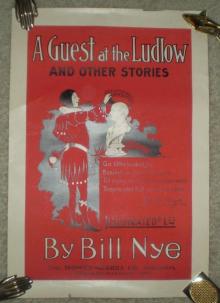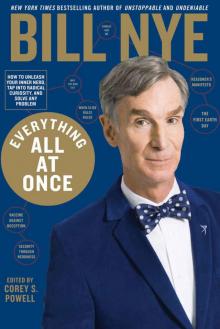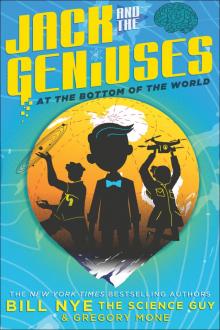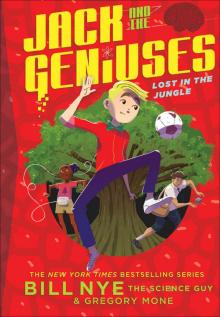Jack and the Geniuses Read online
Page 2
“Wait.” Ava was crouching at the base. “This thing is on rails, and there’s some kind of electric motor under here. But I can’t figure out how to activate it.”
Ava swept her fingers along the underside of the Dumpster. Matt checked near the lid, then ran his hands across the logo painted on the left side.
“What does H-W-I stand for?” I asked.
“I don’t know,” Matt said, “but look closely at the i.”
The dot above the lowercase letter was actually a small square piece of see-through plastic, with a red button behind it. Matt and Ava both stood frozen, unwilling or unable to take the next step. See, that’s one of my roles. When you hang out with geniuses, it’s hard to find a way to be useful. So I plan. I scheme. Occasionally I talk my siblings into situations they’d avoid on their own. But that never feels like enough, so I’m usually the one who takes the risks. Sometimes that means testing a rocket-powered skateboard named Pedro. Sometimes it means jabbing at a cleverly hidden button to see what happens next.
I used a fingernail to pry open the plastic cover, pushed the red button with my thumb, then jumped back as the Dumpster instantly slid to my left along the alley wall, revealing a large rectangular hole in the pavement and a set of aluminum stairs. While Matt and I stared in shock, Ava started right down. “I’m coming to get you, Fred,” she called.
“Wait—” Matt said.
There was no point trying to stop Ava. Her boots clanged on the metal stairs as she descended. Matt followed. Three steps down he tripped and had to grab the railing to prevent himself from tumbling to the bottom. Poor Matt. His feet had stretched two sizes since the winter, and he was still figuring out how to steer them around. Normally I laughed when he stumbled, so he glared up at me immediately. I held up my hands. “I didn’t say anything!”
The air inside was cool but not cold; it smelled slightly of bleach. Dull yellow lights shined below us. Halfway down the stairs, I nearly leaped when the Dumpster above slid back over the opening in the pavement. Ava didn’t react, though, so I certainly wasn’t going to admit to being petrified.
The stairs stopped at the top of an enormous escalator rolling down into total darkness. We paused. I tried to look tough but cool, like one of those old-fashioned fighter pilots in their leather jackets and dark sunglasses.
“Jack, do you need to go to the bathroom?” Matt asked.
Apparently my “tough” face wasn’t working.
“We’re not going down there, are we?” Matt asked Ava.
“You can wait here if you want,” Ava said.
After matching deep breaths, my brother and I followed her. Lights began brightening in front of us, dimming at our backs. Ava was smiling when she turned around. “Smart lighting. Sensors activate the bulbs when you get close.”
The escalator ended two or three stories down, but another was right beside it. The air had a dusty and metallic smell now, and Matt guessed we were a hundred feet below the pavement when we finally reached the bottom—a square platform I could cross in three steps. The air was colder here; I shivered. In front of us was a normal-looking door. Neither of my siblings moved. I raised an eyebrow and looked at each of them. They shrugged.
My turn again.
I pushed through the door. It closed behind us. The carpeted room was shaped like a hexagon. Three sides had wide, deep, and very comfortable-looking blue couches. One of the other walls had a door with a long desk posted in front. To our left was a powerful-looking steel door with a painting of a dog hanging beside it. A schnauzer, I think.
I walked toward that door. The carpet was soft. It smelled new.
“No company name or anything, huh?” Ava noted.
“Maybe it really is a spy’s headquarters, Ava,” I said.
I scanned a pile of packages, letters, and thick catalogs on the floor below the dog portrait. Each was addressed to one of several different “H.W.I.” companies. The only label with a person’s name on it was a return address stuck to a yellowing envelope that looked like it had gotten into a street fight with a dozen other letters. The envelope was wrinkled, torn in places, and dotted with dried mud. The sender’s name was Anna Donatelli, and her return address was Antarctica. “Check this out,” I said. “A letter from the North Pole.”
Matt walked over. “Antarctica is the South Pole,” he said.
Sometimes I wished they’d just let me be wrong.
Matt pressed his head against the wall, inspecting the dog painting from the side. Then he held his hand below it. Smiling, he lifted the picture frame from the bottom. It swung open, revealing a metal chute.
“Cool way to get your mail,” Ava remarked.
The door behind the desk opened with a low hiss. I resisted the urge to hide behind one of my siblings.
We waited. Nothing happened.
“Hello?” Matt called out. “We’re sorry to bother you, but we’re trying to find my sister’s . . .”
His words trailed off as a tall red robot wheeled into the room. After living with Ava for almost two years, I knew it was a humanoid—a machine with two arms, a head, and two eyelike cameras. But she’d never shown me any videos of one like this before.
Matt apologized again, speaking slowly and clearly so the robot could understand him.
In a flat, emotionless voice the machine asked, “What are you doing here? This is private property.”
Ava was smiling. “You can chat? That’s amazing. We’re sorry to intrude, but I lost my—”
“What are you doing here? This is private property. What are you doing here? This is private property.” The robot began repeating itself, speaking faster each time.
“Something’s wrong with its code,” Ava said.
“Or it’s angry,” I suggested, backing toward the door to the stairs. I tried to turn the handle. “Uh, guys, the door’s locked.”
The robot moved out from behind the desk, rolling toward us on three large wheels, repeating its words faster and faster. A red light on its chest began flashing.
“Ava, what does that mean?” Matt asked.
“How should I know?”
“I think it means we need to find another way out,” I said.
Matt sidestepped over to the steel door and pressed a circular button beside its frame.
The robot’s light flashed brighter. Now its words were jammed together into a single crazed stream. “Whatareyoudoingherethis . . .”
With a slow creak, the steel door slid open, revealing an old-fashioned elevator car. Matt grabbed me and practically tossed me inside, then pulled Ava by the back of her shirt. “Get in! Get in!”
The humanoid opened a compartment in its chest.
The elevator door was closing at the pace of a garden-slug race. The robot pulled something out and flung it at us. I ducked the shot, and a yellowish clump splattered on the dark-wood paneling behind me. The elevator door was barely halfway closed. The robot was rolling closer. The machine threw something, striking Matt in the chest. My brother shouted and fell to the floor.
Ava kicked the door with the heel of her boot. Finally it slammed shut. The elevator lurched, and we felt ourselves riding up. Matt grabbed a clump of yellowish stuff from his shirt and hurled it against the wood paneling. It fell to the floor with a splat.
“Are you okay?” I asked.
He scooted away, pressing himself against the wall. Ava looked more bewildered than frightened. A big chunk of the stuff was hanging from the paneling behind me, too, and I reached out to touch it.
“Jack, no!” Matt said. “It could be toxic.”
I leaned in closer and sniffed. The scent was familiar. I peeled the stuff from the wall, bit off a chunk, chewed, then spat it out. In our little family, I’m the closest thing to a cook, and this particular substance was the basis of one of my signature meals. “It’s just pizza dough,” I said.
“So was that some kind of pizzabot?” Matt asked.
The elevator clanked to a stop before Ava could rep
ly. The door rolled open and we stepped into a storeroom of some kind. The walls were lined with shelves. We were surrounded by jars of pickles and mayonnaise, plastic tubs of sauerkraut, and loaves of white bread. Matt slapped me on the shoulder with the back of his hand. He breathed out, long and hard, then smiled. “See? Multiple ways in and out, like rabbits.”
There was a swinging wooden door on the other side of the storeroom. Ava nudged it open, and we stepped into the back of a deli that stank of burned coffee. Behind the counter, the German deli owner, with his long moustache and mustard-stained apron, started shouting at us, waving a long loaf of unsliced bread. So we ran. Out through the deli’s front door, past the alley, around the corner. Despite his athletic frame, my brother is challenged as a runner. Normally he’d eat it at least twice on a sprint that long. For once, though, I was glad Matt didn’t trip and fall, and we put at least four blocks behind us before we stopped.
Between breaths Matt asked, “How . . . in the world . . . did all that just happen?”
I was still too startled to speak. The lifesaving cushion. The flying security camera. The Dumpster entrance to a secret room. The attack by a pizza-dough-flinging robot. Honestly, I was still processing everything, and my heart was racing with a mix of excitement and fear. But my sister was somewhere else emotionally. The thrill of escape had faded. Now all that was left was disappointment. Her eyes were slightly closed. Her mouth formed a flat line. While Matt and I had just survived a strange and wild adventure—a morning like none other—Ava had lost a friend. I was responsible. And I had to find a way to get Fred back.
2
AN UNUSUAL INVITATION
Maybe this is a good time to introduce myself. Yeah. Probably. I’m Jack. I’ve had four sets of parents, none very good at the job. The last pair couldn’t even scramble an egg. Ava and Matt are my sister and brother by law—not blood—but you’d guess that at a glance. Matt has short dark hair, olive skin, and a nose that takes a sharp downward turn at the halfway point. His gray eyes bulge out like telescopes, and over the last year he grew too fast to maintain what little balance and coordination he once had. At fifteen he’s always stumbling, knocking over water glasses, and bumping into doorways with his wide shoulders.
Ava and I are the same age, but she’s a few inches taller, with skin the color of coffee, a round face, and long eyelashes. Her wavy brown hair is always yanked back in a ponytail, and her wide eyes and bright smile can melt even the meanest adults. When she walks, the heels of her high-top boots barely touch the ground, and her small hands are scarred in places—a hazard of building her mechanical marvels. Me? I’m as pale as a paper towel, with brown eyes, straight blond hair that Ava says I comb too often, and perfect teeth. Okay. That’s not true. They’re slightly crooked. Also, unlike Matt, I don’t have any muscles yet, but I’m only twelve. I’m hoping they’ll show up soon.
But enough about the looks. The important thing here is that my siblings are geniuses. You’ve probably—heard of them, since they get most of the attention. Not many people know that their bestselling book of poems, The Lonely Orphans, was actually my idea. Sure, the verses are really sappy and “roses are red” simple, but we needed cash, Ava and Matt are clever with rhymes, and I knew the book would sell. Moms and grandmothers really eat up that heartbroken orphan stuff. Not into poetry? Well I’m sure you’ve seen that video of the kid giving CPR to a puppy. That was me. Fifteen million hits, thank you very much. The whole thing was fake—the little guy was just sleeping—but it worked a public relations miracle for us.
Also, we’re not really orphans anymore. Call us independent. Or, as Ava likes to say, autonomous. A few years ago, Ava, Matt, and I ended up with the same foster parents. The two of them were already winning awards for their brains, skipping from one grade to the next like stones across a pond, and one night I had an idea. We’d just made ourselves dinner, because Alice and Bob were out, as usual. Halfway through my bowl of boxed macaroni and cheese with sliced hot dogs, I glanced up at my brother and sister and asked, “Can’t we just get rid of the adults and take care of ourselves?” At first Matt said it was illegal. I asked if he was sure. Then Ava repeated my question. Matt stared at the wall for a few minutes, then got up, walked out the door, and spent the next two days in the library of a local law school. Alice and Bob didn’t even notice he was gone. Matt came back as if it had only been a few minutes since we’d asked him the question. “No,” he said, “I’m not sure. We might have a chance.”
In the end, it took several court cases, some powerful lawyers, a book of cheesy poems to make enough money to pay the lawyers, a fake puppy video to convince the public to love us, and a brilliantly acted, fake-tear-filled speech by Ava. But we got rid of Alice and Bob. I guess you could say we divorced our foster parents. And, aside from all the newspapers describing us as “two young geniuses and their brother,” I was thrilled with how it all worked out. A nice lady from Social Services named Min checks on us weekly, but we’re pretty much flying solo now. Matt takes college classes, and Ava and I both homeschool; we meet with our instructors online. My grades are fine, I guess, but I never feel all that smart. That’s one of the downsides of living with geniuses.
So, anyway, we live on our own in a small Brooklyn apartment, and after getting chased out of the deli by the bread-waving German, that’s where we waited for the next three days, desperately trying to come up with a plan to retrieve Ava’s robot. Three separate times I attempted to sneak back into the strange building without telling my siblings, but the Dumpster was locked, and the guy in the deli tried to attack me with a squeeze bottle of mustard every time I got close to his front door.
Neither Ava nor Matt were all that happy with me, because they’d figured out I’d lied about our little spy operation being legal. Using a drone to peer into someone’s windows is totally against the law, and one of the terms of our “autonomous” childhood was that we had to be on nearly perfect behavior at all times. So now there was a chance we’d lose more than a homemade robot. I was sure Min was going to show up at any moment and tell us we were going to be split up and thrown into different foster homes. I’d end up with a family of asparagus farmers in Canada. They’d be the kind of people who flushed the toilet only once a day to save water.
That’s the way I thought it was going to work, anyway.
But for seventy-two hours there was no knock at our door.
Our phone didn’t ring.
And I started to wonder if we were safe.
Then, a little after six o’clock on Sunday night, Matt called out from the kitchen. The room was really more of a workshop. Sure, it housed a microwave and a fridge, and my little coffeemaker was tucked away in a back corner of a counter. But Ava had replaced the oven with a 3-D printer and taken most of the cabinet and drawer space for her spare parts and tools. The kitchen table was crammed with computers and circuit boards.
My brother and sister were standing in front of her laptop. “What’s up?” I asked.
“You just got an e-mail from Henry Witherspoon.”
I shrugged. “Who’s he?”
“A scientist, an inventor, a pretty amazing engineer. And the head of Henry Witherspoon Industries. The guy has worked on rockets, robots, electric cars, space telescopes—”
“He helped invent the nose vacuum, too.”
Ava knew how to speak my language. I’d been dying to get a nose vacuum for months, but they were too expensive. Basically, instead of a tissue, you just placed this device, about the size of a Sharpie cap, up your nostril, and it automatically sucked out any unwanted material. “Why is he writing to me?”
Matt spread his arms wide. “Because that was his building we tried to break into!”
“Oh.”
Arms crossed, Ava stared at me. “And it appears that you may have written him a note?”
“Yes, well . . . is he mad?”
“No, that’s the thing. He’s inviting us to dinner tonight.”
“Then I s
hould get dressed,” I answered.
An hour later we were back in the alley, standing at the Dumpster. We were already late, and that part was my fault. We didn’t get invited to dinner very often, so I’d wanted a few extra minutes to figure out what to wear. Is that so crazy? My siblings had thought so, but I took my time anyway, and settled on a nice blue button-down shirt, a striped bowtie, a pair of jeans, and black Samba sneakers. The bowtie was new, and it took me seven tries to get the knot just right.
“This entrance is under repair,” a voice said from behind us.
All three of us spun around. A tall, thin man was standing there. A leather bag was slung over his shoulder. His eyes were wrinkled at the corners. His graying hair and slight beard were buzzed to the same length, and he wore a T-shirt with two buttons at the collar and an equation scrawled across the middle. He pointed at each of us in turn. “Ava, Matt, John. Yes?”
“Yes,” Ava answered. “You’re Henry Witherspoon?”
“Indeed,” he said with a laugh. “Where are my manners? Excuse me, please.”
“You can call me Jack,” I said, extending my hand. “He prefers Matthew, though.” My brother grimaced. He hates his full name. “It’s an honor to meet you, Mr. Witherspoon.”
We shook hands, and his was so huge, it practically swallowed mine. “Call me Hank,” he said. “I must compliment you on your tie, Jack. I was once fond of such professorial attire myself.” Before I could respond, his eyes lit up. He held up one of his long fingers, reached into his bag, and carefully removed Ava’s drone. “You built this?” he said to Ava, holding Fred out to her.
She bit her lower lip and reached for him. I held my breath. The man had been nice enough so far, but this was the point at which we’d learn whether “Hank” Witherspoon was going to be a friend or an enemy. Thankfully, he passed Fred right to her. I was pretty much floating with relief.
“Don’t worry,” he continued. “The HR-4 grabbed it with a net normally used in the practice of lepidoptery. That’s the study of butterflies, but you probably knew that.” He pointed to one of Fred’s propellers. “Those are repurposed computer fans?”

 A Guest at the Ludlow, and Other Stories
A Guest at the Ludlow, and Other Stories Everything All at Once: How to unleash your inner nerd, tap into radical curiosity, and solve any problem
Everything All at Once: How to unleash your inner nerd, tap into radical curiosity, and solve any problem Jack and the Geniuses
Jack and the Geniuses Lost in the Jungle
Lost in the Jungle